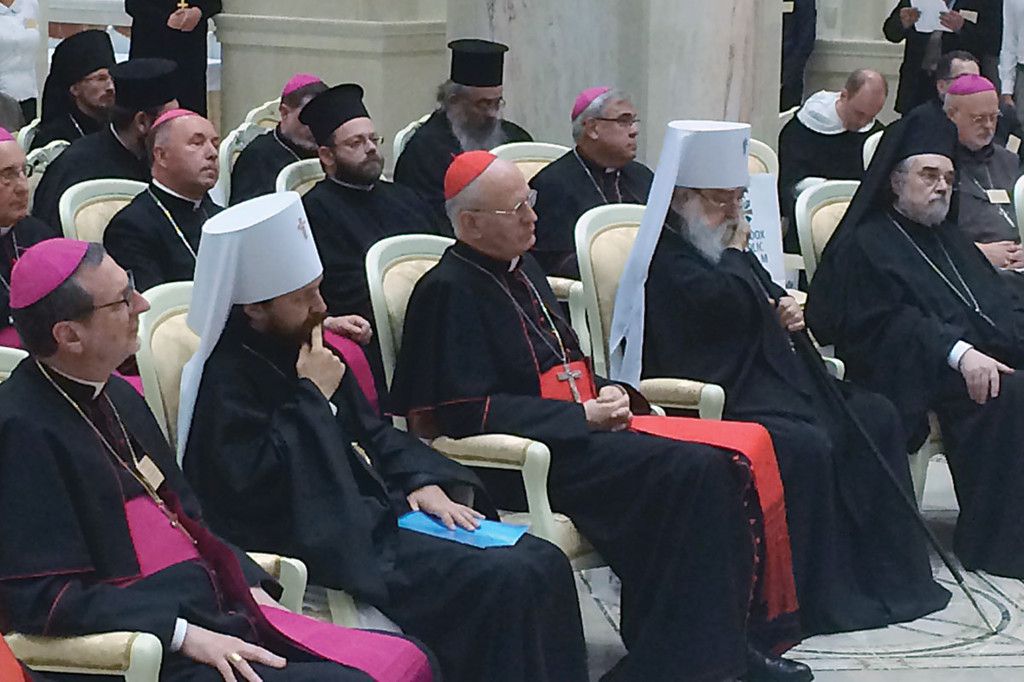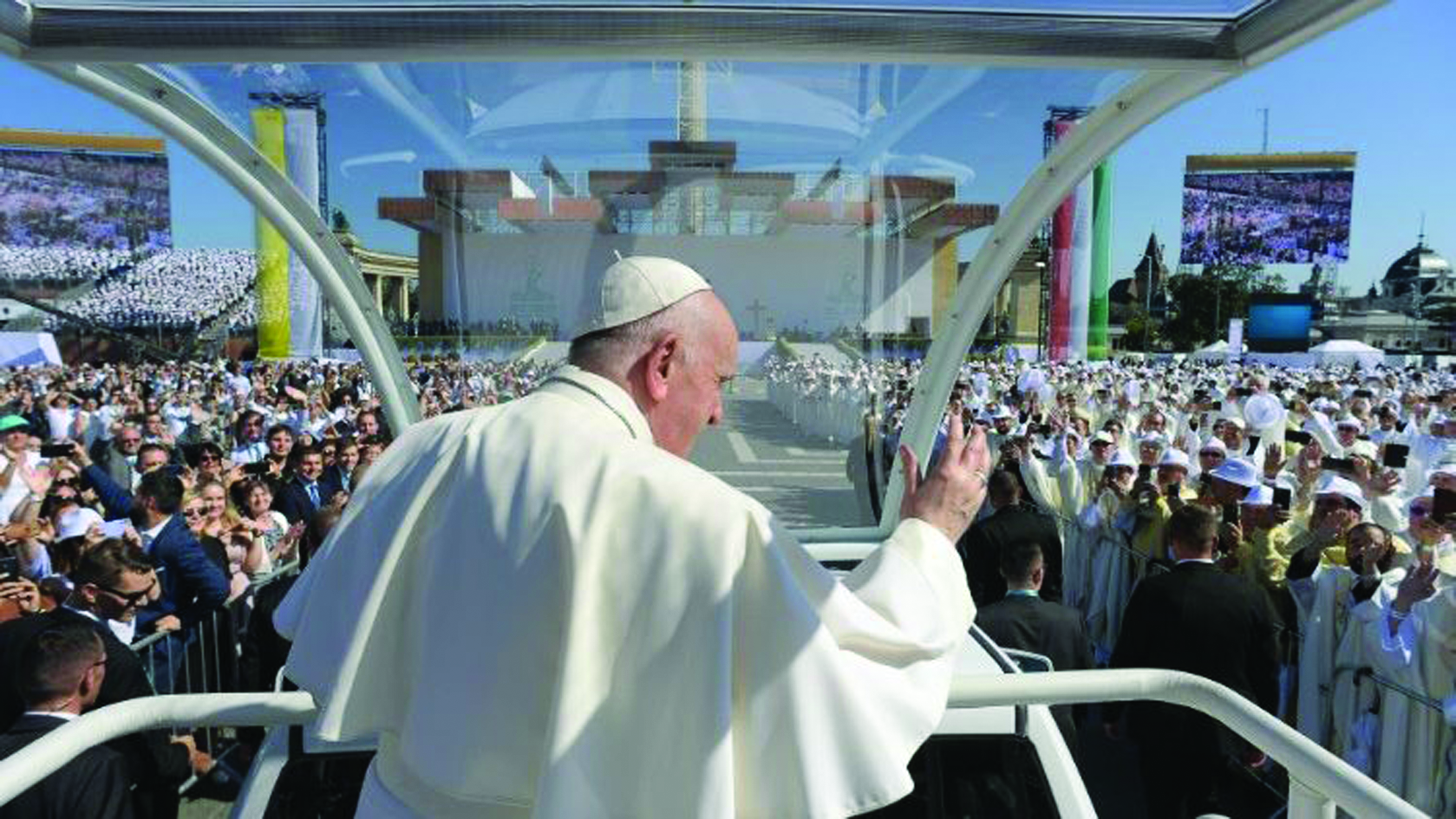“As pastors we want to continue to bring the best of our moral teaching to our people, and as citizens to present it to our governments and to the European institutions,” two dozen Orthodox and Catholic bishops of Europe said in a joint statement issued after a 5-day meeting in Minsk, Belarus, in early June. “In Christ, we find our inspiring source that renews us.” In this way, the participants in the Fourth European Orthodox-Catholic Forum, meeting on the theme “Religion and Cultural Diversity: Challenges for the Christian Churches in Europe,” set Christ at the center of their hope for Europe’s future, as Christ was the center of hope for so many centuries in the continent’s past.

In this photo from the opening of the Fourth Orthodox-Catholic Forum in Minsk, Belarus, on
June 2, Cardinal Peter Erdo, Archbishop of Budapest and Esztergom in Hungary, is flanked by two Russian Orthodox prelates, Metropolitan Hilarion (left) and Metropolitan Filaret.
The final message, containing nine points, addressed issues discussed during the meeting. “Our message wants to be first of all a sign of joy and hope,” the participants said. “We know that many are suffering and are in search of a word that gives sense to their life. Indeed, where Christian faith and morality have been dismissed, a feeling of emptiness leads many to despair and nihilism. The Church offers consistent values by incorporating humanity in Christ, the source of all true values.”
The representatives of the Churches stressed that “faith in Christ does not abolish human diversity,” but rather “enriches and promotes the elements of truth and goodness already present in human cultures.”
The Forum was held in Minsk, the capital of Belarus (White Russia), from June 2 to 6 at the invitation of the Patriarchal Exarch of All Belarus, His Eminence Metropolitan Pavel of Minsk and Sluzk.
The discussions were led by the two co-chairs of the Forum, Greek Orthodox Metropolitan Gennadios of Sassima from the Ecumenical Patriarchate of Constantinople, and Cardinal Péter Erdoő of Budapest, Hungary, president of the Council of the Bishops’ Conferences of Europe.
Participants expressed their deep gratitude to the local Orthodox and Catholic Churches: to Metropolitan Pavel and to His Excellency Tadeusz Kondrusiewicz, Archbishop of Minsk-Molihev, for their commitment in supporting the Forum.
The conference opened with a prayer for peace in Europe and Ukraine, offered in the crypt of Minsk’s Memorial Church of All Saints and Innocent Victims in the Motherland, an imposing building erected in memory of the long history of suffering and martyrdom of the Belarussian people.
In Minsk, a modern, attractive, clean city with wide boulevards and many new buildings, more than 35 representatives of the Orthodox Churches in Europe and of the European Bishops’ Conferences enthusiastically welcomed the messages addressed to them at the beginning of proceedings by His All Holiness the Ecumenical Patriarch Bartholomew, His Holiness Pope Francis, and His Holiness Patriarch Kirill of Moscow and All Russia. The latter was read by His Eminence Metropolitan Hilarion of Volokolamsk, president of the Department for External Church Relations of the Patriarchate of Moscow.
In addition to the many hours of work sessions, the representatives of 22 countries in Europe were able to experience the generous hospitality of a nation which has been rather isolated from the rest of Europe, and of a hospitable people open to dialogue. Belarus has been a hinge between the “eastern lung” and the “western lung” of Europe, and showed through this conference that it can still act as a bridge for a Europe still seeking to learn how to breathe with two lungs.
During the meeting, the Minsk authorities, as well as the president of Belarus, Alexander Lukashenko, received the conference participants with open warmth. In his remarks, Lukashenko said that “today Christian belief represents an inalienable component of the outlook and the spiritual life of the majority of our citizens.”
On June 4, participants at the Forum met with many ambassadors to Belarus at a reception hosted by the apostolic nuncio in Belarus, Archbishop Claudio Gugerotti, on the occasion of the Pope’s feast day (feast of St. George). The meeting in Minsk was organized by the Saints Methodius and Cyril Christian Educational Center (www.christeducenter.by), under the presidency of His Eminence Metropolitan Filaret, currently Honorary Patriarchal Exarch of All Belarus.
The First European Orthodox-Catholic Forum was in December 11-14, 2008, in Trent, Italy, on the family; the second in Rhodes, Greece, on October 18-22, 2010, on Church-State relations; and the third in Lisbon, Portugal on June 5-8, 2012 on the present economic crisis and poverty. The next conference will be held in Paris in 2016. The conference was supported in part by a grant from the Urbi et Orbi Foundation, a project of the publisher of this magazine.






Facebook Comments